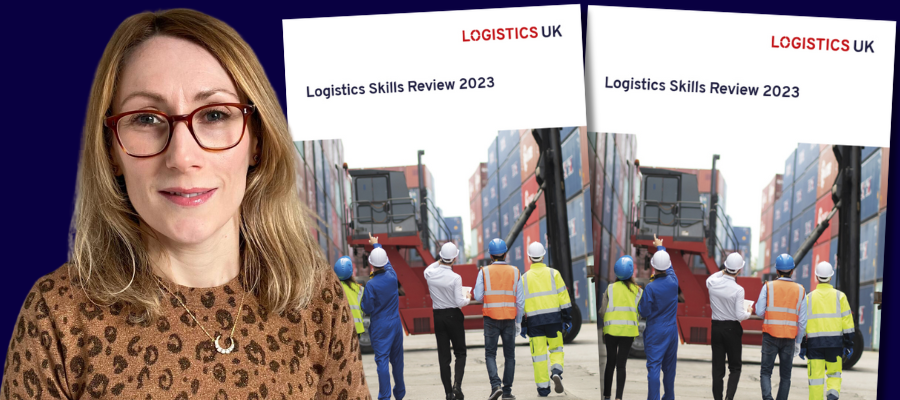🕒 Article read time: 2 minutes
Apprenticeship Levy system failing logistics industry, says Logistics UK

The UK’s apprenticeship system needs a radical overhaul if businesses which make regular Levy payments into the scheme are to be able to train new recruits using these funds, according to a new report from business group Logistics UK.
According to Logistics UK’s Logistics Skills Review 2023, there is great interest across industry to take on apprentices. However, over the past five years only 4% of levy-paying employer accounts were able to utilise the funds available to them fully.
Michelle Gardner, Deputy Director of Policy at Logistics UK, explains: “Our latest report found that the total estimated amount of funding possible to be recovered by businesses in transport and logistics since the levy was introduced was £250 million.
“However, during the same period, the sector paid in £825 million in levy funds. This is unacceptable – especially considering the current economic climate – and highlights the urgent need to overhaul the Apprenticeship Levy, especially if industry’s long-term skills shortage is to be resolved.
“With 68% of respondents to Logistics UK’s survey interested in taking on apprentices, it’s clear there’s demand across industry to support growing talent, but the current system is fundamentally flawed.
“Traditionally, there have been many barriers to entry for candidates and businesses, such as minimum skills requirements and minimum duration of the apprenticeship – many of which do not apply to logistics roles – as well as restrictive business size specifications, which prevent further uptake of the training scheme.
“Since 2021, Logistics UK has been highlighting to government the need for the current system to be replaced with a more flexible Training Levy to enable realistic training and development programmes for new recruits.
“The industry itself is working hard to fill skills gaps and introduce the next generation of workers to the sector via initiatives such as Generation Logistics. However, it’s now vital that government responds accordingly, to remove barriers and ensure a skilled workforce continues to be available to keep the UK economy supplied with everything it needs.”
To view a copy of the report, please visit: www.logistics.org.uk/research-hub/reports/logistics-skills-review
Published On: 17/08/2023 13:00:00

Comments Section
If you are a Logistics UK member login to add comments.
In brief
Government Biomass Strategy suggests role for low carbon fuels
The government has published its Biomass Strategy, which outlines plans to continue to facilitate biomass deployment through a range of incentives and requirements covering power, heat and transport.
The strategy points to the continuing importance of low carbon fuels – including biofuels – in replacing fossil fuels in transport.
It states that heavier vehicles and vessels covering long distances will continue to require liquid and gaseous fuels for some time to come and that, in these cases, biofuels can play a vital role in providing an alternative to fossil fuels and reducing carbon emissions.
*www.gov.uk/government/publications/biomass-strategy
New UK regulations to improve electric vehicle charge point reliability and accessibility
Under the new Public Charge Point Regulations 2023, set to be introduced in the coming months, the UK’s electric vehicle rapid charging network will be required to have a 99% reliability rate and offer real-time status updates for users.
Charging firms will be required to increase the availability of contactless payment systems, with all new public chargers faster than 8kW mandated to offer contactless payments.
Firms will also be required to allow customers to pay via a third-party provider. Fines of up to £10,000 for each unit could be issued to firms that fail to comply with these regulations.
*www.legislation.gov.uk/ukdsi/2023/9780348249873
Logistics UK responds to the Transport Committee call for evidence on the future of transport data
The Transport Committee launched a call for evidence to gain insight into the potential uses of data to improve planning and delivery of transport services, maintenance, and management of transport assets.
In its response to the call for evidence, Logistics UK highlighted that the logistics sector is becoming more data driven and integrated: however, logistics and freight data tends to be intertwined with general transport data. Logistics UK argued that better separation would allow for more specific, tailored strategies that address the unique challenges and opportunities within the logistics industry.
Logistics UK’s full response is available here – members must log in to the portal to view.
Latest articles
Generation Logistics Case Study
Niall Delargy, Senior Marketing Executive – Motia.
Read time: 2 minutes
View article
Member notice: Do you need to apply for an IVA for your vans and light goods vehicles?
Apply for Individual Vehicle Approval (IVA) if you're making or importing a very small number of vans or light goods vehicles (also known as IVA 1LG).
Read time: 2 minutes
View article
Thames’ biggest port launches new commercial vehicle charging hub
Fleete has unveiled its first major project in the UK with the development of a dedicated commercial vehicle rapid electric charging hub, believed to be the largest in the country.
Read time: 3 minutes
View article